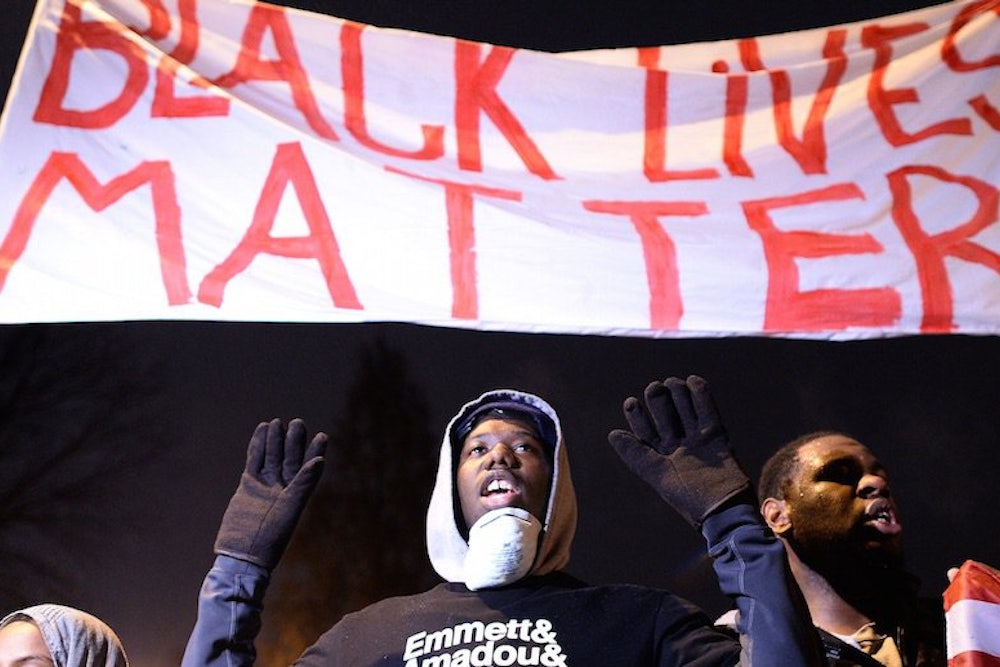Monday marked six months since the killing of Michael Brown in Ferguson, Missouri. His name does not appear anywhere in a lawsuit filed Sunday night in a federal district court, but a civil-rights issue that his death brought to light is driving this latest legal challenge: Ferguson’s systematic and unconstitutional criminalization of poverty—more specifically, the jailing of city residents too poor to pay fines associated with traffic violations and other minor offenses.
The lawsuit—and a near identical one in the neighboring city of Jennings—was brought by a group of St. Louis County residents who hope to convince a federal judge that their claims are so widespread and their injuries so similar that they deserve class-action status. The plaintiffs come from various walks. Their ages range from 23 to 62, and they are mothers, military veterans, low-wage workers, or simply residents coping with unemployment, underemployment, or disabilities. They each have unique stories of how they came in contact with Ferguson authorities and how they were sucked into a “debtors’ prison network” of court appearances, transfers to other jails, payment plans, and difficulties with childcare. According to the 55-page lawsuit, each of the litigants “pleaded that they were unable to pay due to their poverty, each was held in jail indefinitely, and none was afforded a lawyer or the inquiry into their ability to pay that the United States Constitution requires.”
St. Louis County and its suburbs—as reports by NPR, The Washington Post, and others show—are not only some of the most racially segregated communities in Missouri, but also derive an important chunk of their fiscal revenue from court fines and fees. The plaintiffs allege that this “modern debtors’ prison scheme has been increasingly profitable” to Ferguson, estimating the revenue at $10 million over the past five years. If the entire St. Louis metro region extracted fees at Ferguson’s rate, the lawsuit contends, the revenue stream would amount to $1.3 billion. There are also claims of extortion by city officials, of “grotesque” jail conditions, of arbitrary fine modifications aimed at maximizing profit, of fearful children detained while their parents served jail time.
But the lawsuit still faces a long road ahead. Federal court rules are very specific with respect to class certification, and the legal team behind the lawsuits—which includes attorneys from Equal Justice Under Law, ArchCity Defenders, and the St. Louis University School of Law—must ensure that their clients’ stories and alleged injuries are sufficiently similar to warrant treatment as a class. If the court agrees and certifies the class, other similarly situated claimants could come forward and join the case, potentially raising the stakes and the significance of the legal issues. And if later the class succeeds on its civil-rights claims, the case could be an iconic reminder of the root causes that led Ferguson to become a part of the national conversation.
Federal class actions take years, even decades, to resolve. Recent settlements in major civil-rights cases in New York City illustrate how protracted these court battles can become. The first one stemmed from a massive wave of arrests at the 2004 Republican National Convention in Manhattan, where protesters claimed unlawful detention and violation of their First Amendment rights; the city in that case agreed last year to settle with protesters for $18 million. In what is perhaps the largest Fourth Amendment case in city history, Mayor Bill de Blasio, shortly after taking office, fulfilled a campaign promise and settled with a class of black and Latino New Yorkers who in 2008 sued to challenge the NYPD’s controversial stop-and-frisk program. A long road ahead, indeed.
Ferguson is no New York, but it could certainly use an encouraging sign from a legal system that, thus far, has only proved discouraging. Some of its residents are now suing for relief from a municipal scheme that, in their words, is “Dickensian” and “flagrantly violates the basic constitutional and human rights” of the most vulnerable among them. Whether the courts view these claims as valid civil-rights infringements or just another set of grievances—the stuff of protests and the democratic process—will test if the Constitution serves as a shield for more sophisticated forms of oppression.
